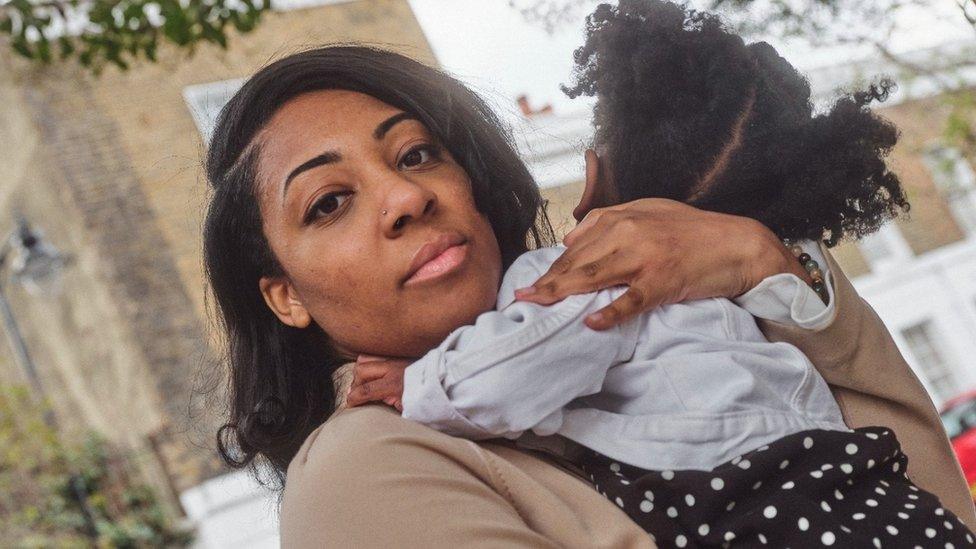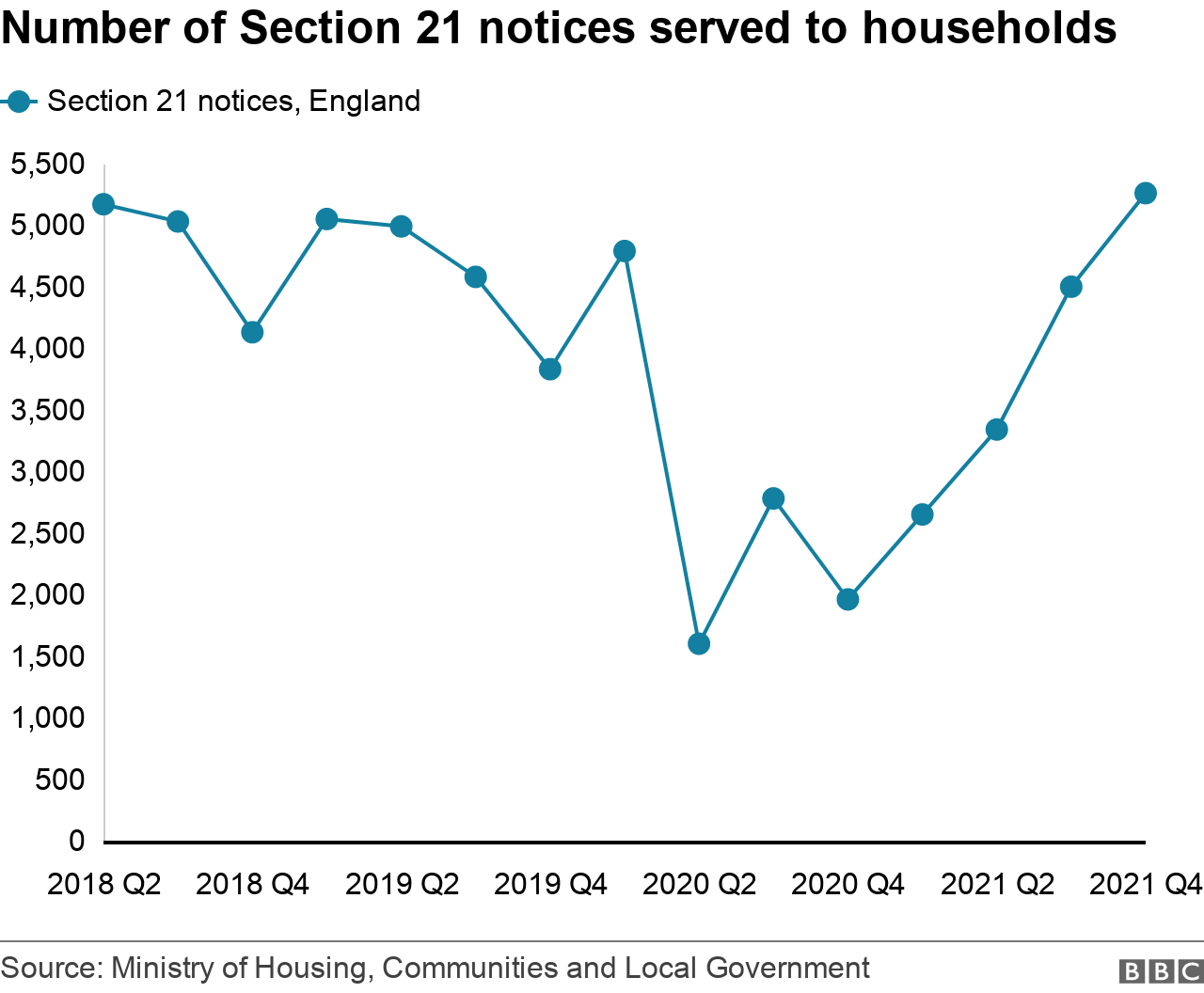Renting: No-fault evictions to be banned in England
- Published

Landlords are to be prevented from evicting tenants in England without giving a reason, under proposals published in a government White Paper.
The Renters Reform Bill will also end blanket bans on benefit claimants or families with children - and landlords must consider requests to allow pets.
Housing charity Shelter called it a "game-changer".
But landlords associations said the government must ensure the changes would not worsen the housing crisis.
Of all the private renters leaving accommodation in 2019 and 2020, 8% had been asked to go by their landlord, the Department for Levelling up said.
No-fault evictions are already banned in Scotland for tenancies starting after 1 December 2017
The Welsh government says no-fault-eviction notice periods will be extended to six months by the end of 2022
Legislation to extend the notice period for tenancies is going through the Northern Ireland Assembly

'It was a horrible situation'

Krystalrose was served a no-fault eviction after complaining about mould
Krystalrose Shirley was served with a no-fault eviction in October 2021 after complaining about mould and other issues in her private rented property in Enfield, north London.
The 28-year-old had lived there for two years with her young daughter and said finding somewhere else was a nightmare.
"I struggled to find somewhere [else] to live, especially being on DSS [housing benefit]. It was really hard to find somewhere suitable for me and my daughter I went to the council but I kept being fobbed off.
The council eventually housed her nearby, but the flat is far from ideal, she says: it is due to be knocked down, and the bathroom ceiling is leaking. She hopes the proposed changes will mean other people aren't faced with the same situation.
"The property damaged my furniture, we were ill with mould, we suffered and at the end they told us to get out. This will stop landlords thinking they can do that to tenants for no reason and give the tenants a bit more power."

Shelter chief executive Polly Neate said: "The Renters Reform Bill is a game-changer for England's 11 million private renters.
"Scrapping unfair evictions will level the playing field.
"For the first time in a long time, tenants will be able to stand up to bad behaviour instead of living in fear,"
"Gone will be the days of families being uprooted and children forced to move school after being slapped with a Section 21 no-fault eviction for no good reason."

The government has also promised tenants stronger powers to:
challenge poor practice and unjustified rent increases
obtain rent refunds for unhealthy, unsafe or poor quality homes.
Its Decent Homes Standard will be extended to the private sector, meaning:
homes must be free from serious health and safety hazards
landlords must keep homes in a good state of repair, with clean, appropriate and useable facilities
The bill will also:
end "arbitrary" rent-review clauses, so tenants can leave poor-quality housing without being liable for the rent
double notice periods for rent increases
give councils stronger powers to tackle the worst landlords and increase fines for serious offences

Who rents their home and who is most likely to be evicted?
Around 13 million people in the UK rent from a private landlord
More than one third of private renters live with children
About 46% of under-35s in England rent from private landlords
Nearly 230,000 private renters in England have received no-fault eviction notices since 2019
Female-led single parent households made up a quarter of those threatened with eviction in England, in 2020-21
About 32% of those threatened with eviction were single adult males
How will a ban on 'no fault' evictions work in practice?
The details of how the new rules will work in England is not yet clear. But no fault evictions are already banned in Scotland, where landlords cannot evict tenants purely because they want them to leave.
The rules vary depending on the type of tenancy and when notice is given but for private tenancies starting from March 2022, there are 17 official reasons or "grounds for eviction" that landlords can give.
These include that the landlord wants to move into the property, or that the tenant is behind on at least three months' rent.
The landlord has to give tenants the right amount of notice depending on the grounds they want to use, and they can apply for a housing tribunal for an eviction order if the tenant won't move out.
They can't evict the tenant until the tribunal decides to give an eviction order.

Levelling Up and Housing Secretary Michael Gove said: "For too long many private renters have been at the mercy of unscrupulous landlords who fail to repair homes and let families live in damp, unsafe and cold properties, with the threat of unfair 'no fault' evictions orders hanging over them.
"Our New Deal for renters will help to end this injustice by improving the rights and conditions for millions of renters."
For private landlords, the bill offers "greater clarity and support", including:
a private-renters' ombudsman to settle disputes cheaply and quickly
ensuring landlords can efficiently recover their properties from antisocial tenants
a property portal to help landlords comply with their responsibilities and tenants understand their rights
National Residential Landlords Association chief executive Ben Beadle said: "Whilst headline commitments to strengthening possession grounds, speedier court processes and mediation are helpful, the detail to follow must retain the confidence of responsible landlords, as well as improving tenants' rights.
"We will be analysing the government's plans carefully to ensure they meet this test.
"A failure to do so will exacerbate the housing crisis at a time when renters are struggling to find the homes they need."

INSIDE THE ELIZABETH LINE: The 15 billion pound railway
'I FIND IT UNBELIEVABLE': Richard Osman delves into his Brighton roots
